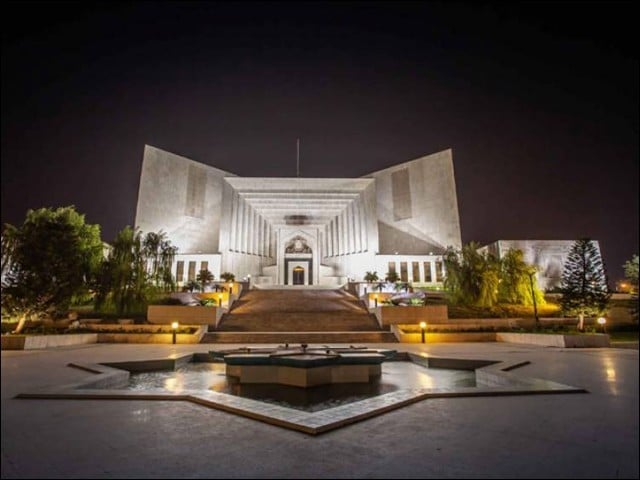SC strikes down lifetime ban on MPs
In boost to Nawaz’s bid for PM’s office, 6-1 majority judgment revokes disqualification under Article 62(1)(f)

The Supreme Court on Monday overturned lifetime bans for individuals with criminal convictions, removing a significant barrier for PML-N leader Nawaz Sharif's potential re-election in the upcoming general elections.
The verdict also opens the path for Jahangir Tareen of the Istehkam-e-Pakistan Party to contest elections.
Nawaz Sharif, a three-time former prime minister and a prominent figure in the absence of Imran Khan, had previously faced disqualification in 2017 and a subsequent lifetime ban over corruption charges.
After a self-imposed exile in the UK in 2019, Sharif returned to Pakistan in October, witnessing a series of legal victories that nullified various charges against him.
With a 6-1 majority judgment, the apex court ruled it cannot enforce lifetime bans from office under Article 62(1)(f) of the Constitution because it "abridges the fundamental right of citizens to contest elections and vote for a candidate of their choice".
The seven-member larger bench headed by Chief Justice of Pakistan Qazi Faez Isa and comprising Justice Syed Mansoor Ali Shah, Justice Yahya Afridi, Justice Aminud Din Khan, Justice Jamal Khan Mandokhail, Justice Ali Mazhar and Justice Musarrat Hilali had reserved the verdict on Jan 5, which was announced on Monday.
The seven-page written order reads: “Article 62(1)(f) is not a self-executory provision as it does not by itself specify the court of law that is to make the declaration mentioned therein nor does it provide for any procedure for making, and any period for disqualification incurred by, such declaration.
“There is no law that provides for the procedure, process and the identification of the court of law for making the declaration mentioned in Article 62(1)(f) of the Constitution and the duration of such a declaration, for the purpose of disqualification thereunder, to meet the requirements of the fundamental right to a fair trial and due process guaranteed by Article 10A of the Constitution.
“The interpretation of Article 62(1)(f) in imposing a lifetime disqualification upon a person through an implied declaration of a court of civil jurisdiction while adjudicating upon some civil rights and obligations of the parties is beyond the scope of the said Article and amounts to reading into the Constitution.
“Such reading into the Constitution is also against the principle of harmonious interpretation of the provisions of the Constitution as it abridges the fundamental right of citizens to contest elections and vote for a candidate of their choice enshrined in Article 17 of the Constitution, in the absence of reasonable restrictions imposed by law.
“Until a law is enacted to make its provisions executory, Article 62(1)(f) of the Constitution stands on a similar footing as Article 62(1)(d), (e) and (g), and serves as a guideline for the voters in exercising their right to vote.
“The view taken in Sami Ullah Baloch case treating the declaration made by a court of civil jurisdiction regarding breach of certain civil rights and obligations as a declaration mentioned in Article 62(1)(f) of the Constitution and making such declaration to have a lifelong disqualifying effect amounts to reading into the Constitution and is therefore overruled.
“Section 232(2) added in the Elections Act, 2017, prescribes a period of five years for the disqualification in terms of Article 62(1)(f) and has also made such declaration subject to the due process of law. This provision is already in field, and there remains no need to examine its validity and scope in the present case.”
Syed Ali Imran, the Secretary of the Supreme Court Bar Association (SCBA), stated that the SCBA sought to withdraw appeal filed in 2022, therefore, the said appeal and petition were dismissed as withdrawn.
In April 2018, the Supreme Court had ruled that lawmakers disqualified under Article 62(1)(f) would be unable to contest elections for the rest of their lives. However, in June last year, the government passed the Elections (Amendment) Act, 2023 that limited the disqualification of a lawmaker to five years.
In its verdict on Monday, the top court also observed that the Elections (Amendment) Act, 2023 prescribed a period of five years for disqualification of lawmakers.
"Section 232(2) added in the Elections Act, 2017, vide the Elections (Amendment) Act, 2023 promulgated on 26 June 2023, prescribes a period of five years for the disqualification incurred by any judgment, order or decree of any court in terms of Article 62(1)(f) of the Constitution and has also made such declaration subject to the due process of law," the verdict read.
"This provision is already in field, and there remains no need to examine its validity and scope in the present case."
Nawaz was found guilty of corrupt practices in 2017. While the latest case was filed by other disqualified politicians, the ruling enables the three-time former prime minister to contest the polls as more than five years have elapsed since his conviction.
On the other hand, Nawaz’s arch-rival, Imran Khan, would not be able to benefit from the ruling as it only scrapped lifetime bans, which means the cricketer-turned-politician remains disqualified until 2028.
Meanwhile, Justice Yahya Afridi, in his dissenting note, said, “For reasons to follow, the extent of lack of qualification of a member of parliament, as envisaged under Article 62(1)(f), is neither lifelong nor permanent, and the same shall remain effective only during the period the declaration so made by a court of law remains in force. Therefore, the conclusion so drawn by this court in Sami Ullah Baloch is legally valid, hence affirmed.”


















COMMENTS
Comments are moderated and generally will be posted if they are on-topic and not abusive.
For more information, please see our Comments FAQ